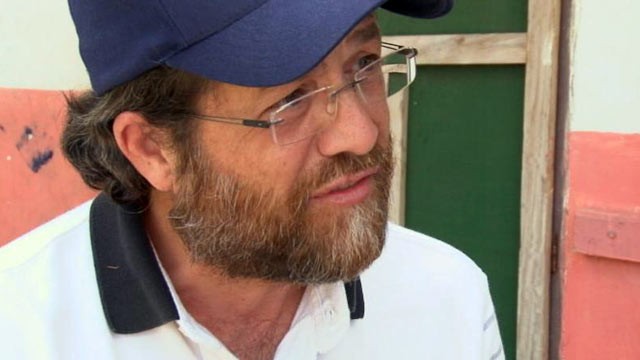
(above) Jacob Ostreicher has been sitting in Palmasola Prison in Santa Cruz, Bolivia, for almost a year, uncharged, but accused by Bolivian authorities of money laundering. (ABC News)
7 Bolivian Officials Arrested, Accused of Extorting Jailed American Man
November 28, 2012 - ABC News
By LAUREN EFFRON (@LEffron831) and ALEX WATERFIELD
Seven Bolivian government officials were arrested on Tuesday after being accused of a plan to rob and extort an American who has been jailed without charge in the South American country for 18 months, according to Bolivia's interior minister.
Jacob Ostreicher, a businessman from Brooklyn who has maintained his innocence, has long said that Bolivian officials targeted him for his successful rice growing venture they seized when he was arrested last year after being accused of money laundering.
Go to original article to view a related video:
US Man Jailed in Bolivia Uncharged
At a press conference on Tuesday, Bolivia's Interior Minister Carlos Romero announced the arrests of the seven officials, including the Interior Ministry's director of legal affairs, Fernando Rivera, and the judge who first jailed Ostreicher. But he offered few details other than to say those detained were suspected of illegal enrichment and extortion, among other crimes.
In May, "Nightline" traveled to Palmasola, the Bolivian prison where Ostreicher had been held since his arrest in June 2011, to hear his story first-hand.
"Absolutely 100 percent innocent," Ostreicher told "Nightline" anchor Terry Moran at the time. "And the prosecutors know I am 100 percent innocent."
In Palmasola, there are no guards inside the walls. Prisoners govern themselves. They walk around the streets and alleys between the pavilions of cells. Some bring their wives and children to live with them. Murders are common, as are drugs and prostitution.
"I never, never go out at night," Ostreicher said at the time. "It is absolutely frightening, walking around, like what you -- wherever you walked today, at night, it's very scary."
Despite the arrests, Ostreicher's wife, Miriam Ungar, today told "Nightline" exclusively that she is keeping her expectations for her husband's freedom tempered, saying she was not getting her hopes up that the arrests meant her husband would be released.
Jacob Ostreicher, a 53-year-old former flooring contractor, turned to growing rice in Bolivia in 2008 after he said a family friend -- a prominent lawyer in Switzerland -- told him it would be a promising investment opportunity.
Ostreicher said he put $200,000, his life savings, into the venture and became a very junior partner in a $25 million project. He said things went well for a year or so. The first harvest yielded nearly 40 million pounds of rice. More than 200 Bolivian workers were employed. Ostreicher helped manage it, traveling frequently to Bolivia.
Then in 2011, Bolivian police arrested one of Ostreicher's former employees and accused him of being involved with drug criminals. Ostreicher said he cooperated fully with police -- and then was arrested himself.
Prosecutors claimed they were investigating whether the $25 million that started the rice business came from drug money, but they have yet to produce evidence to support their allegations.
"So we spent close to $20,000 to get together 1,300 documents to show them the origin of the money," Ostreicher told "Nightline." "We provided that to the judge. And the judge gave me my freedom."
But six days later, the judge reversed his decision and Ostreicher was sent back to prison. The judge was later promoted to the appellate court, further delaying proceedings.
Today, Ostreicher is in a Santa Cruz hospital after being diagnosed with Parkinson's disease, but remains in Bolivian police custody. Bolivian authorities said that Bolivian law allows for the incarceration of people without charge for up to 18 months.
Ostreicher has been in prison for 545 days and at his most recent hearing, on Aug. 30, a judge denied his request to be released on bail, according to his website.
The Ostreichers have five children and 11 grandchildren. Miriam Ungar said the little ones don't understand what happened to their grandfather.
On the wall in the dining area near his cell, Ostreicher's fellow prisoners had painted an American flag for him to bring him comfort, but it has since been painted over.
"Nightline" anchor Terry Moran and The Associated Press contributed to this report
